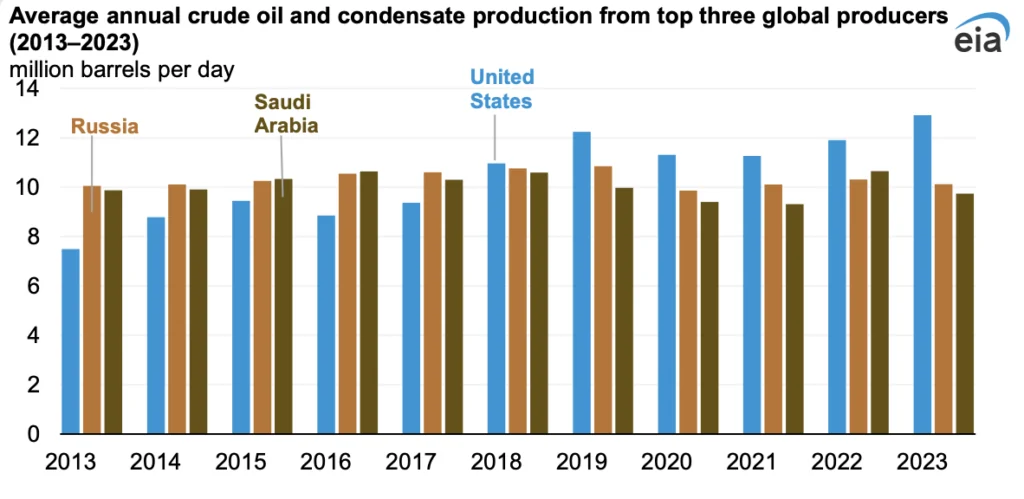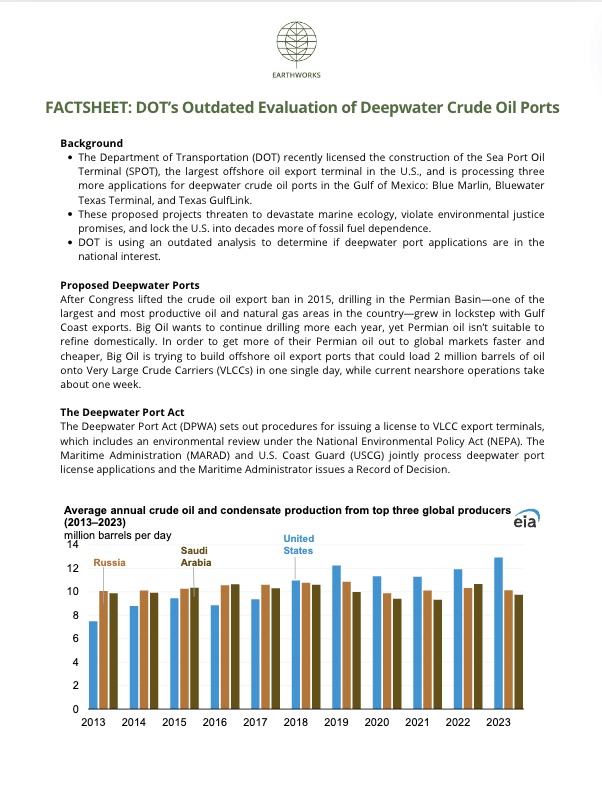Background
- The Department of Transportation (DOT) recently licensed the construction of the Sea Port Oil Terminal (SPOT), the largest offshore oil export terminal in the U.S., and is processing three more applications for deepwater crude oil ports in the Gulf of Mexico: Blue Marlin, Bluewater Texas Terminal, and Texas GulfLink.
- These proposed projects threaten to devastate marine ecology, violate environmental justice promises, and lock the U.S. into decades more of fossil fuel dependence.
- DOT is using an outdated analysis to determine if deepwater port applications are in the national interest.
Proposed Deepwater Ports
After Congress lifted the crude oil export ban in 2015, drilling in the Permian Basin—one of the largest and most productive oil and natural gas areas in the country—grew in lockstep with Gulf Coast exports. Big Oil wants to continue drilling more each year, yet Permian oil isn’t suitable to refine domestically. In order to get more of their Permian oil out to global markets faster and cheaper, Big Oil is trying to build offshore oil export ports that could load 2 million barrels of oil onto Very Large Crude Carriers (VLCCs) in one single day, while current nearshore operations take about one week.
The Deepwater Port Act
The Deepwater Port Act (DPWA) sets out procedures for issuing a license to VLCC export terminals, which includes an environmental review under the National Environmental Policy Act (NEPA). The Maritime Administration (MARAD) and U.S. Coast Guard (USCG) jointly process deepwater port license applications and the Maritime Administrator issues a Record of Decision.

National Interest Assessments
The Deepwater Port Act requires that a proposed deepwater port must be in the national interest by demonstrating that the ports are “consistent with national security and other national policy goals and objectives, including energy sufficiency and environmental quality.” The criteria for the national interest determination is outdated, insufficient, and has not been robustly analyzed to date on existing deepwater port applications. In reviewing the applications for deepwater ports, the USCG and MARAD have failed to consistently and rigorously analyze the impact of these projects.
Earlier this year, MARAD approved the Sea Port Oil Terminal (SPOT) and failed to to fully account for the impact of this project by using baseless assumptions that deepwater ports would export up to 2 million barrels of oil each without increasing oil production, by simply replacing demand from existing nearshore export terminals.
New deepwater ports will drive more drilling, raise the risks of oil spills on land and offshore, increase air pollution for onshore environmental justice communities, and impede important progress to cut greenhouse gas emissions. Analysis from Global Energy Monitor estimates that over their 30-year lifespan, the oil transported from the proposed projects (SPOT, Texas GulflLink, Bluewater Texas Terminal, and Blue Marlin) would generate 24 billion metric tons of carbon once burned, equivalent to 5,712,043,632 cars or 6,169 coal plants.
Reforms to Improve Deepwater Port Reviews
Without updating guidance, the review of these projects will fall under the same faulty criteria that does not ensure national policy goals of environmental quality, energy sufficiency and environmental justice. The national interest review must take into account the nation’s interest in securing a clean energy future, the urgent need to meaningfully address the climate crisis, and the imperative to halt the environmental injustice facing frontline communities that time and again bear the full brunt of a petrochemical, oil-and-gas export, and fracking boom. Each of these realities weigh heavily against licensing the proposed projects. Right now, the Biden-Harris Administration is strengthening and updating similar public interest evaluations for LNG exports. It is imperative to take similar action for the national interest determinations of deepwater crude oil ports.
To fully assess whether deepwater crude oil port projects are in the national interest, DOT must pause all new deepwater port licensing decisions, reopen the record of decision for SPOT, and develop new guidance to ensure they consider environmental justice, climate, and public health to determine whether new deepwater oil projects are in the national interest.
For more information please contact:
Kelsey Crane
Earthworks Senior Policy Advocate
kcrane@earthworks.org | 202-899-5681
Allison Woolverton
Earthworks Federal Fossil Fuels Campaigner
awoolverton@earthworks.org | 225-733-4966

